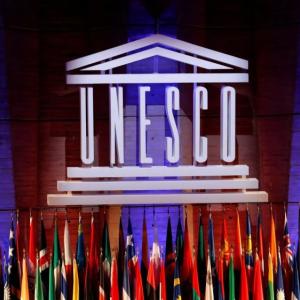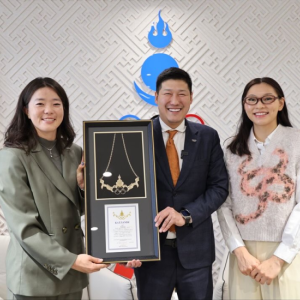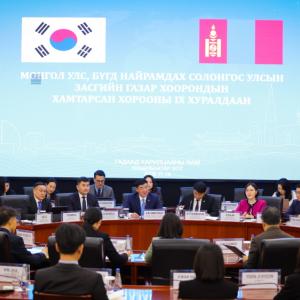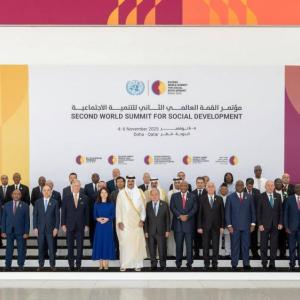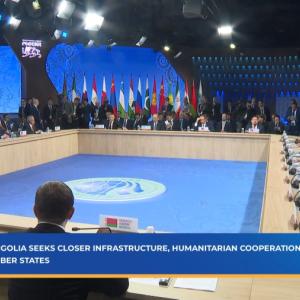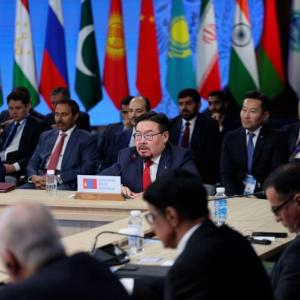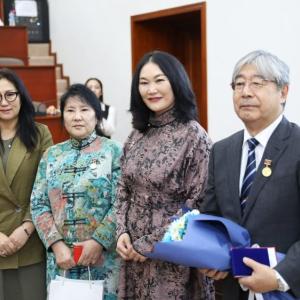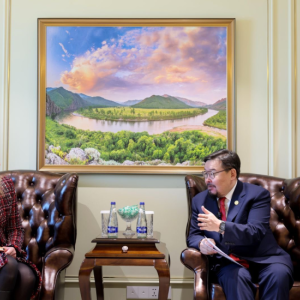AmCham Mongolia, EuroChamber host online discussion on banking sector
Economy
Ulaanbaatar/MONTSAME/ The American Chamber of Commerce in Mongolia (AmCham Mongolia), in partnership with EuroChamber Mongolia, organized an online roundtable on banking sector resilience and reform, bringing together a pool of prominent experts to discuss the existing challenges and define ways forward for banking sector development in Mongolia.
The panelists were S. Bold,
Senior Economics Officer, ADB; U. Ganzorig, Founder and Chairman of the Board,
Mandal Insurance; G. Tsevegjav, Chief Executive Officer, XacBank; John Bell, Chief
Executive Officer, Khan Bank; and L. Amar, Executive Director, Mongolian
Bankers’ Association.
Erik Versavel, Chair of the AmCham Financial Services
Committee, Vice-Chairman of the EuroChamber Board, and Country Director at ING
Bank moderated the roundtable. The roundtable was highly popular with around
100 attendees, including AmCham members and representatives from domestic and
international businesses. They discussed a range of critical issues, including
the macroeconomic outlook of the country considering the significant impact of
the COVID-19 pandemic on the economy and banking sector, as well as the
government’s economic stimulus package and the central bank’s responses, the
status of Mongolia’s IMF program enrollment, and banking sector risks and
reforms.
In his opening remarks, O. Adiya, AmCham Mongolia’s Executive Director, stated that this was the first event jointly organized with EuroChamber and that he looked forward to insightful dialogues between the distinguished panelists. In his presentation, ADB’s S. Bold provided an update on the macroeconomic outlook of Mongolia in light of the COVID-19 pandemic.
He highlighted the following:
First, global and regional economic prospects and expectations have dramatically changed in the last 3-6 months, shifting from synchronized slowdown to downturn and recession due to the COVID-19 pandemic.
Second, Mongolia’s economic growth had been slowing down before the COVID-19, and the pandemic outbreak has severely hit the economy through both external spillover and the risk of a domestic outbreak. Thus, economic growth forecasts now show a significant downward trend, as the country expects a substantial output loss. In this critical situation, ensuring financing stability, protecting employment, and maintaining social security are the top priorities.
Third, various economic sectors, such as mining, transportation, tourism, manufacturing, industry, services, trade, MSMEs, public finance, monetary aggregates, and banking, have substantially been affected by the COVID-19 pandemic.
Fourth, due to heightened risks and pressures on the balance of payments and the state budget, Mongolia’s external and domestic financing needs to be significantly increased.
Fifth, countries across the Asia-Pacific region have been implementing comprehensive economic policy packages in response to the COVID-19 pandemic, consisting of coherent fiscal, monetary, prudential and other financial measures with both short-term targets and medium-term focuses on shock mitigation and relief, followed by stimulus and recovery measures when supply and demand constraints ease after global containment of the pandemic.
Lastly, he shared some of the experiences of the ADB’s 68 member countries in
terms of fiscal and monetary policy and countercyclical measures in response to
the COVID-19 pandemic, and ADB’s role, support and response options.
Following presentations, the roundtable discussion among the
panelists commenced. XacBank CEO G. Tsevegjav stated, “XacBank had started bank
reform in-house by cutting unnecessary expenditures, investing in digital
technology, and managing risks to make ready for an economic rebound.” He also
said that a bank’s transparent communication with customers is essential during
this pandemic, as it allows for win-win solutions for customers and the bank.
He concluded that there would be more challenges ahead, and it is likely to
take at least a year to recover from the economic crisis.
MBA CEO L. Amar stated, “The economy was slowing for five
consecutive quarters; as a result, the ongoing credit crunch has severely
accelerated. Without the intervention of policymakers, the banks can’t fulfill
their role as financial intermediaries in this situation. As a result, the
economy will continue to suffer.” He further noted that banking sector reform
is mostly focused on the concentration of shareholder stakes and making the
banks transparent. Several other issues are being proposed, but it seems as if
policymakers can’t reach a consensus on how to proceed with reforms.
Chairman of the Board of Mandal Insurance U. Ganzorig
stated, “A critical part of financial and banking reforms is to undertake
pension reform since Mongolia’s social insurance system is very outdated. The
draft legislation on pension reform is to be discussed by Parliament.”
CEO of Khan Bank John Bell emphasized, “Times of crisis
bring opportunities to review business models and to optimize operations. Khan
Bank is implementing teleworking, allowing staff to work remotely using modern
technologies to ensure speedy work processes and service delivery to
customers.”
Following the panel discussion, the panelists took part in a
Q&A session and answered questions from the virtual audience.
After the roundtable, Executive Director of EuroChamber
Tomas Bravenec thanked the panelists and participants for their informative and
straightforward discussions, and thanked AmCham for a great partnership, noting
that we will hold similar dialogues in the future.
Source: amcham.mn
 Ulaanbaatar
Ulaanbaatar






